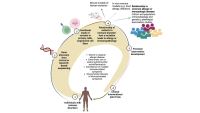Milner Lab

Location and Contact Information
- Contact the Milner Lab jdm2249@cumc.columbia.edu
Principal Investigator
Members of the Milner Lab research the genetics and immunopathology of inborn disorders of the immune system, with the ultimate goal of identifying pathways relevant for diagnosis and treatment of both rare and common allergic and immunologic diseases.
Project Areas
Discovery of Genetic Diseases Associated with Immune Dysregulation
We use a combination of genetics, functional genomics and ex vivo study of patient cells and tissues to establish novel disease associations between genes/variants and immune phenotypes. Examples of active research areas and previous publications:
- CADINS, STAT5bGOF, PLAID, ERBIN mutation, PGM3 deficiency, IL6 Receptor and IL6ST deficiency, Hereditary Alpha Tryptasemia
Primary Immune Regulation Disorders
Allergic disease in monogenic immune disorders
Monogenic immune disorders in regular clinical settings
Small and large scale functional laboratory testing for diagnosis of immune disorders and elucidation of variants of unknown significance
Mechanisms of Allergy/Immunopathology and Novel Interventions in Primary Atopic Disorders and Primary Immune Regulation Disorders
Example active research areas and previous publications:
JAK/STAT signaling pathway
T-cell receptor signaling pathway
- CBM complex
- mTOR signaling
The cell biology in monogenic disorders and atopic disease
Functional signaling abnormalities in common atopic and inflammatory conditions
A key focus of our lab is to establish what “hard-wired” differences in cellular signaling exist in cohorts of patients with allergic diseases. Given the preponderance of primary atopic disorders that are caused by antigen receptor and cytokine signaling abnormalities, and the overlap of these genotype/phenotype relationships with common settings, we aim to evaluate the pathways in larger cohorts of atopic patients to assess for detectable differences even in “common” diseases. Examples:
- Rare biallelic IL6R loss of function mutations causing atopy and infection, while common IL6R polymorphisms associated with mild loss of IL-6 mediated signaling are associated with common atopic dermatitis and asthma.
- Rare loss of function mutations in MALT1 and CARD11 mutations lead to atopic disease, immune deficiency and immune dysregulation, while common CARD11 polymorphisms which lead to reduced CARD11 expression in lymphocytes are associated with asthma and atopic dermatitis; and a common MALT1 haplotype associated with reduced MALT1 expression in lymphocytes is associated with peanut allergy in genome wide association studies.
